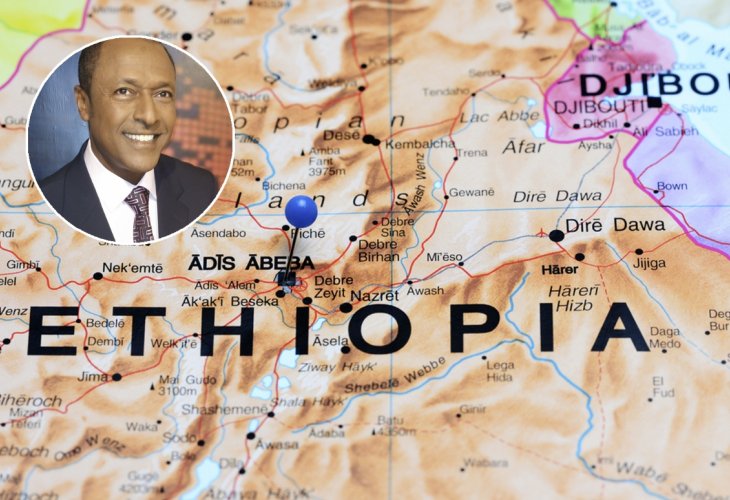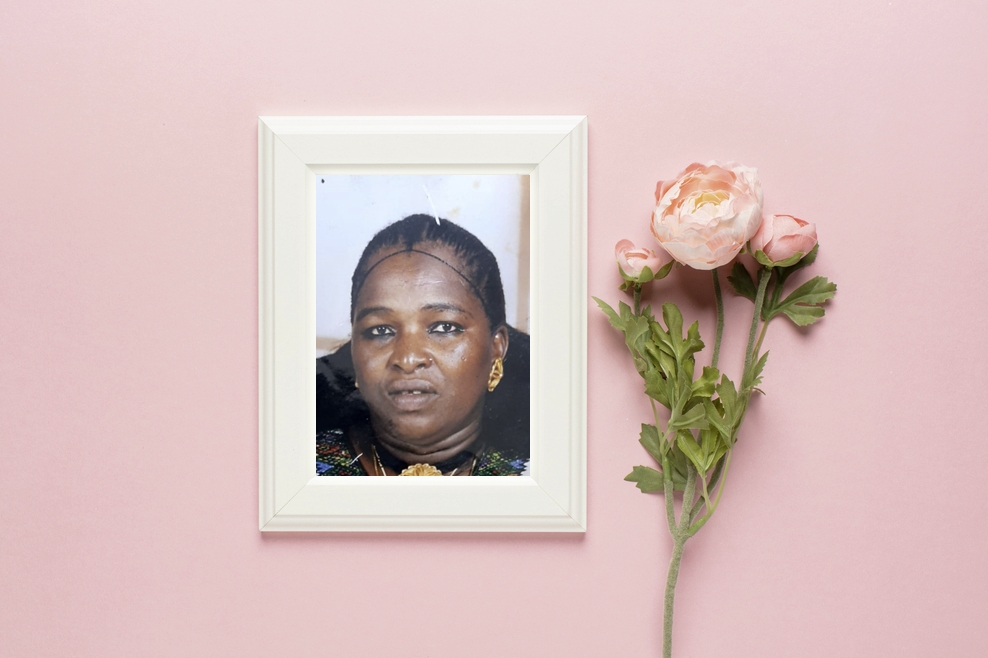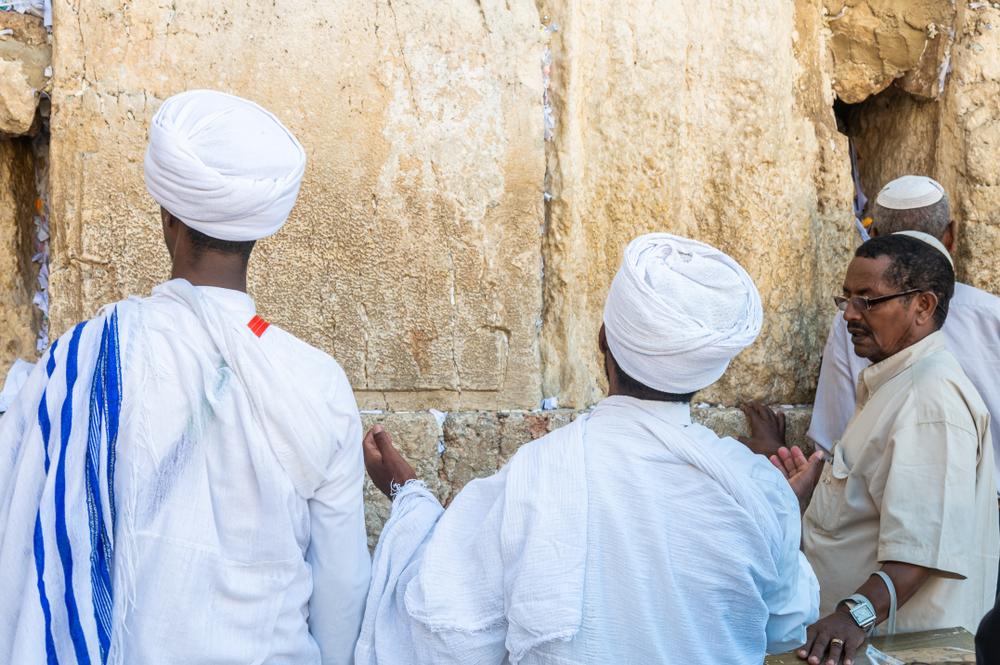Under the Threat of Bombings: What is Happening to the Jews Remaining in Ethiopia?
Amid the chaos and conflict in Ethiopia, hundreds of Jews are grappling with the harsh realities within the tense region. Their relatives recount the painful stories of Tigray's Jews and demand their immigration to Israel.
 (In circle: Yitzhak Lakabruhan)
(In circle: Yitzhak Lakabruhan)The sound of a falling bomb shook the Tigray region in northern Ethiopia. A tile roof was torn from its place as if it were a leaf blown away, and flew towards the slippery slope below. In an instant, a Jewish family living in the area was left without shelter. In this instance, their lives were spared. Not far from there, an entire family was wiped out by the bombings of the Ethiopian army. This is the tragedy that befalls the Jews residing in the Tigray region of northern Ethiopia.
Thousands of Jews in Israel, originally from Tigray, watch with tension and anxiety as events unfold in the African nation. The fear is severe: hundreds of Jews are still residing in the Tigray region, considered one of the most densely Jewish-populated regions in Ethiopia. Now, due to the tension prevailing in the area, these Jews remain unprotected. The official State of Israel remains silent; it does not attempt to rescue the defenseless Jews who are at the mercy of the local forces.
We met with three Tigray natives now residing in Israel. They may live in Israel, but in these turbulent days, their eyes are turned towards Ethiopia, a country physically distant, yet close to their hearts. They are deeply concerned and disturbed by the fate of their acquaintances and loved ones left behind, thus initiating a struggle intended to draw the attention of Israel to the plight of Tigray's Jews and bring them to the country.
Yitzhak Lakabruhan, a prominent figure in the struggle of Tigray natives in Israel, is the grandson of one of the well-known priests who resided in the Ethiopian region. "After my grandfather arrived in Israel, he kissed the ground, and the first thing he asked for was to be buried in the holy city of Jerusalem. However, not everyone was fortunate enough to reach Israel. Some of my acquaintances left behind now stand at the heart of a conflict not of their making," he says with pain.
Wodasa, currently residing in Be'er Sheva, also cannot escape thoughts about what is happening in the Tigray region of Ethiopia. Wodasa's family still lives in the bombarded region. "I have brothers in Addis Ababa and Tigray," she tells 'Hidabroot'. "We are primarily concerned for my nephew's life. He resides in the shelled region, and since the war broke out, contact with him has been lost. Since before the war, he would speak with his mother, my sister, every day, we are very worried about his safety." Wodasa notes that many Jews living there are hoping to be brought to Israel.
 Wodasa
Wodasa
Ahmed’s Sovereignty War
What is happening in the African nation? To understand, we must go back several years, to the years preceding the rise of Abiy Ahmed, Ethiopia's current leader, to power. During the period before his election, the Tigrayans were the dominant force in the large country. Despite comprising only 6% of the population, they ruled all of Ethiopia with an iron fist. Ethiopia's new leader, Ahmed, is not a member of the group, and he began to lead various reforms that sparked a confrontation between the Tigrayans and the official Ethiopian government. Recently, these confrontations have escalated into a bloody battle, which has raised significant concern among the UN and world countries about harming innocent civilians.
"Until about a month and a half ago, almost 7 million Tigrayans lived in peace and tranquility, until one night, their lives changed completely. The situation of the local residents, including the Jews, has turned into a nightmare in recent times," says Lakabruhan, blaming Ahmed for the responsibility for the massacre of the province’s citizens. According to him, Ahmed acts out of a desire to prevent challenges to his rule, and therefore he agrees to sacrifice the innocent residents' lives on the altar.
Why is Ahmed specifically fighting the Tigrayans?
"Ahmed, a member of the Amhara tribe, rose to power about two years ago after managing to form a coalition with another ethnic group in the country, thereby pushing the Tigrayans out of the government," explains Yitzhak. "The new Ethiopian leader effectively ousted from power centers the group that led Ethiopia’s independence and the overthrow of the communist regime, and to complete his sovereign plans he sees a need to push out the strong Tigrayans, who in his eyes may threaten his reign."
In Ethiopia, some accuse Ahmed of wanting to be the almighty leader of the country. "In a speech he gave in the past, he said his parents told him he should serve as the king of Ethiopia, and since then he has been trying to fulfill this and become a dictator, hence he pursued the strongest force standing against him, the Tigrayans. He has insulted them at rallies and speeches, made various unfounded claims against them, withheld budgets, and even cut off electricity to their homes.
The bloody war erupted when Ahmed's army unexpectedly raided the province with planes and commando forces, attempting to seize control of the region through rapid military operations, in many ways, successfully. As part of Ahmed’s struggle to strengthen his rule, he cut off the Tigrayans' internet and telephone and canceled air and land transport in the area. "The height was when more than 45,000 Tigrayans lost their homes. This is daylight murder," warns Lakabruhan.
"Our Families Became Victims"
Not long ago, an interesting meeting occurred between Deputy Minister of Public Security Gadi Yevarkan and the Jews from Tigray now in Israel. The Jews demanded he facilitate the immigration of the Jews left behind, but since then nothing has been done. Yitzhak shares that during the meeting, Tigrayans discussed with Yevarkan the situation faced by Tigray's Jews, who, when they leave the province, face the risk of arrest due to the tension between the Ethiopian government and the Tigrayans.
 (Photo: shutterstock)
(Photo: shutterstock)"We are very concerned for the Jews there. My friends and I grew up there and know the place well, and we are full of worry for the families left behind, many of whom may be among the tens of thousands of refugees who have fled their homes and are now begging for the most basic necessities like clean clothes and water," say the movement's leaders.
What do you actually want?
"Israel can do a lot. It can seize this created opportunity to bring over those who are there. Additionally, we demand that Prime Minister Benjamin Netanyahu and public representatives in the Knesset condemn Abiy Ahmed’s activities for the illegal war he is conducting; the bombings he executed against civilians, described by some who were there as almost genocide."
Lakabruhan notes that such steps should not be a problem for Jerusalem. We are already hearing statements against Ahmed from European countries and the world, who see the horror and are already voicing their disapproval. Ahmed may speak nicely, but he is a war criminal."
Joining the cry of Tigray's exiles in Israel is Noam, who clarifies: "We care only about the Jews living there. The first Jews who came to the land from Ethiopia were Tigrayans, and they have a tremendous role in the entire Ethiopian immigration to Israel. Those left there are their relatives, who couldn't come for various reasons or out of fear of dying in nearby villages, or those who did not have enough money to pay border smugglers.
 Noam
Noam"Since that immigration," Noam continues, "36 years have passed, and these families are now in a very difficult situation. Because of the war that erupted there, some of them fled to neighboring Sudan and to Addis Ababa, the capital of Ethiopia. Unfortunately," he adds, "Israel does not include them in the waiting lists to be brought to the country. We have reached our limits; our family members became victims of the struggle between the government and the locals. Ensure our cry is heard," he requested.

